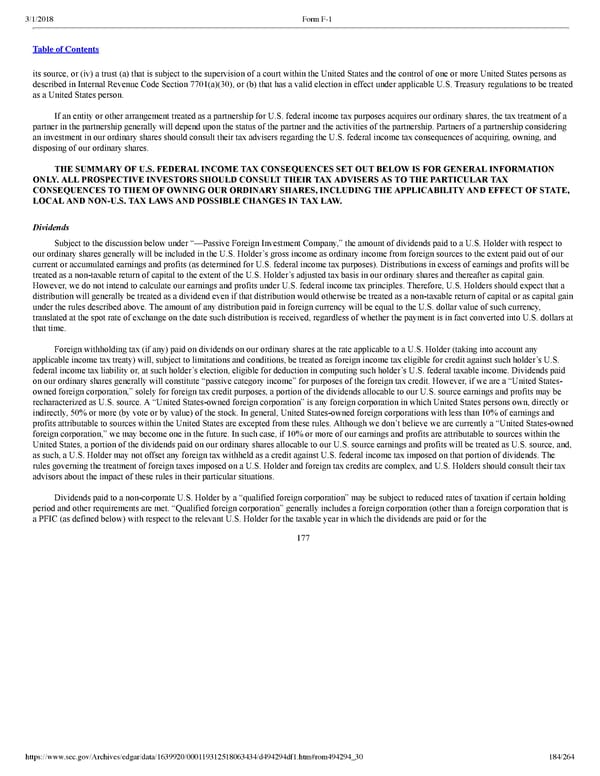184/264 its source, or (iv) a trust (a) that is subject to the supervision of a court within the United States and the control of one or more United States persons as described in Internal Revenue Code Section 7701(a)(30), or (b) that has a valid election in effect under applicable U.S. Treasury regulations to be treated as a United States person. If an entity or other arrangement treated as a partnership for U.S. federal income tax purposes acquires our ordinary shares, the tax treatment of a partner in the partnership generally will depend upon the status of the partner and the activities of the partnership. Partners of a partnership considering an investment in our ordinary shares should consult their tax advisers regarding the U.S. federal income tax consequences of acquiring, owning, and disposing of our ordinary shares. THE SUMMARY OF U.S. FEDERAL INCOME TAX CONSEQUENCES SET OUT BELOW IS FOR GENERAL INFORMATION ONLY. ALL PROSPECTIVE INVESTORS SHOULD CONSULT THEIR TAX ADVISERS AS TO THE PARTICULAR TAX CONSEQUENCES TO THEM OF OWNING OUR ORDINARY SHARES, INCLUDING THE APPLICABILITY AND EFFECT OF STATE, LOCAL AND NONU.S. TAX LAWS AND POSSIBLE CHANGES IN TAX LAW. Dividends Subject to the discussion below under “—Passive Foreign Investment Company,” the amount of dividends paid to a U.S. Holder with respect to our ordinary shares generally will be included in the U.S. Holder’s gross income as ordinary income from foreign sources to the extent paid out of our current or accumulated earnings and profits (as determined for U.S. federal income tax purposes). Distributions in excess of earnings and profits will be treated as a nontaxable return of capital to the extent of the U.S. Holder’s adjusted tax basis in our ordinary shares and thereafter as capital gain. However, we do not intend to calculate our earnings and profits under U.S. federal income tax principles. Therefore, U.S. Holders should expect that a distribution will generally be treated as a dividend even if that distribution would otherwise be treated as a nontaxable return of capital or as capital gain under the rules described above. The amount of any distribution paid in foreign currency will be equal to the U.S. dollar value of such currency, translated at the spot rate of exchange on the date such distribution is received, regardless of whether the payment is in fact converted into U.S. dollars at that time. Foreign withholding tax (if any) paid on dividends on our ordinary shares at the rate applicable to a U.S. Holder (taking into account any applicable income tax treaty) will, subject to limitations and conditions, be treated as foreign income tax eligible for credit against such holder’s U.S. federal income tax liability or, at such holder’s election, eligible for deduction in computing such holder’s U.S. federal taxable income. Dividends paid on our ordinary shares generally will constitute “passive category income” for purposes of the foreign tax credit. However, if we are a “United States owned foreign corporation,” solely for foreign tax credit purposes, a portion of the dividends allocable to our U.S. source earnings and profits may be recharacterized as U.S. source. A “United Statesowned foreign corporation” is any foreign corporation in which United States persons own, directly or indirectly, 50% or more (by vote or by value) of the stock. In general, United Statesowned foreign corporations with less than 10% of earnings and profits attributable to sources within the United States are excepted from these rules. Although we don’t believe we are currently a “United Statesowned foreign corporation,” we may become one in the future. In such case, if 10% or more of our earnings and profits are attributable to sources within the United States, a portion of the dividends paid on our ordinary shares allocable to our U.S. source earnings and profits will be treated as U.S. source, and, as such, a U.S. Holder may not offset any foreign tax withheld as a credit against U.S. federal income tax imposed on that portion of dividends. The rules governing the treatment of foreign taxes imposed on a U.S. Holder and foreign tax credits are complex, and U.S. Holders should consult their tax advisors about the impact of these rules in their particular situations. Dividends paid to a noncorporate U.S. Holder by a “qualified foreign corporation” may be subject to reduced rates of taxation if certain holding period and other requirements are met. “Qualified foreign corporation” generally includes a foreign corporation (other than a foreign corporation that is a PFIC (as defined below) with respect to the relevant U.S. Holder for the taxable year in which the dividends are paid or for the 177
 Spotify F1 | Interactive Prospectus Page 183 Page 185
Spotify F1 | Interactive Prospectus Page 183 Page 185